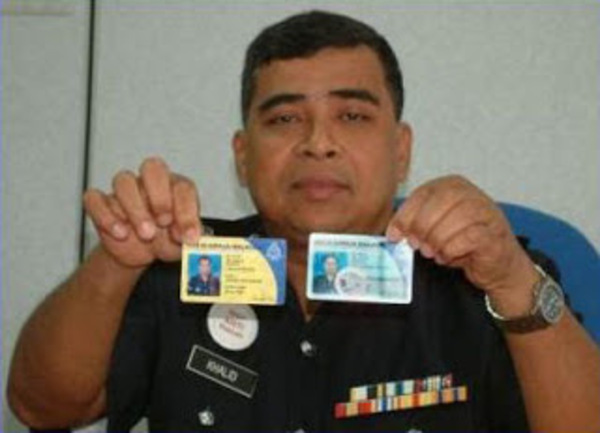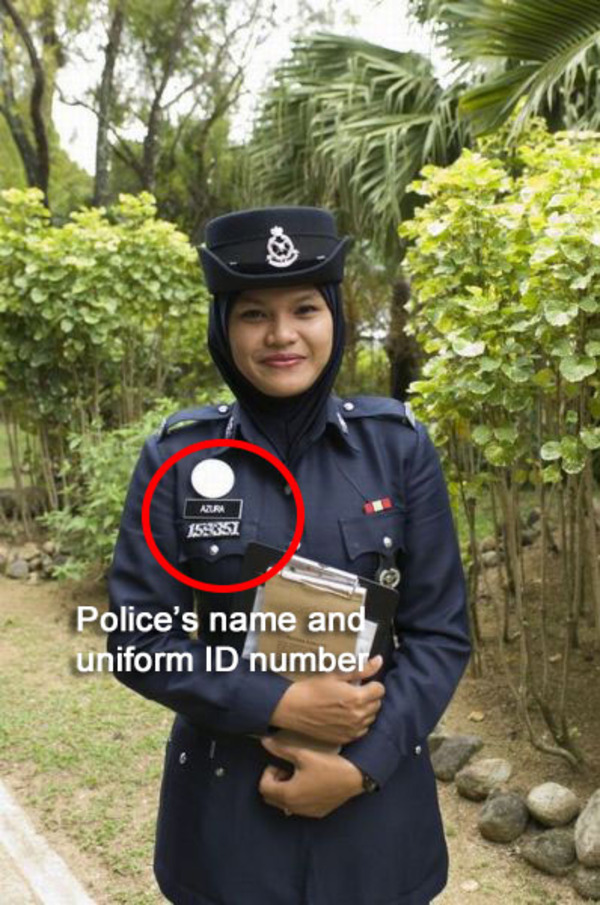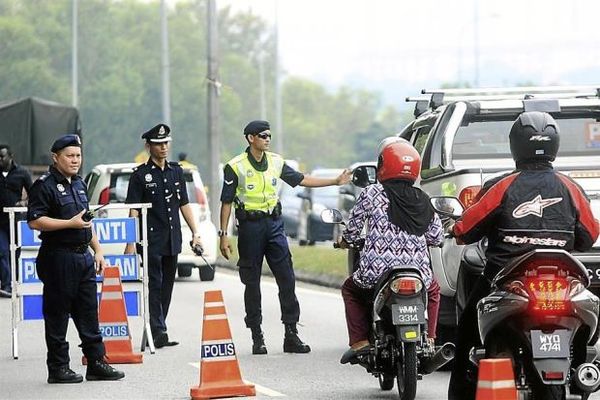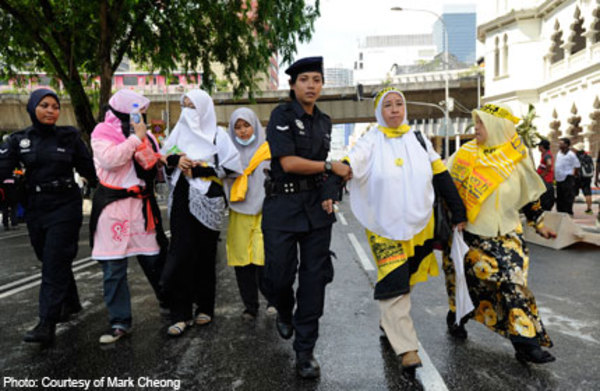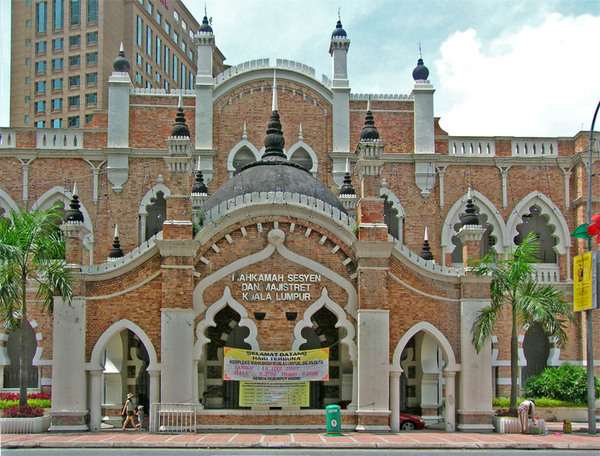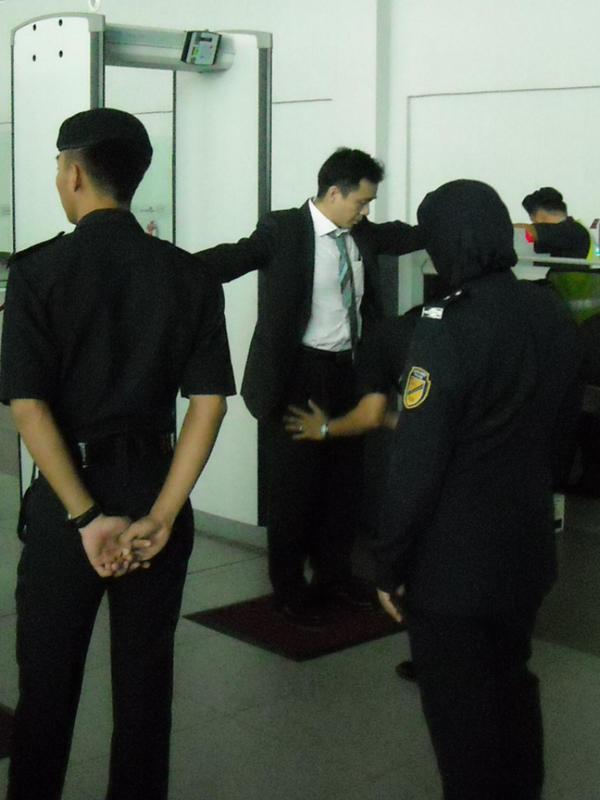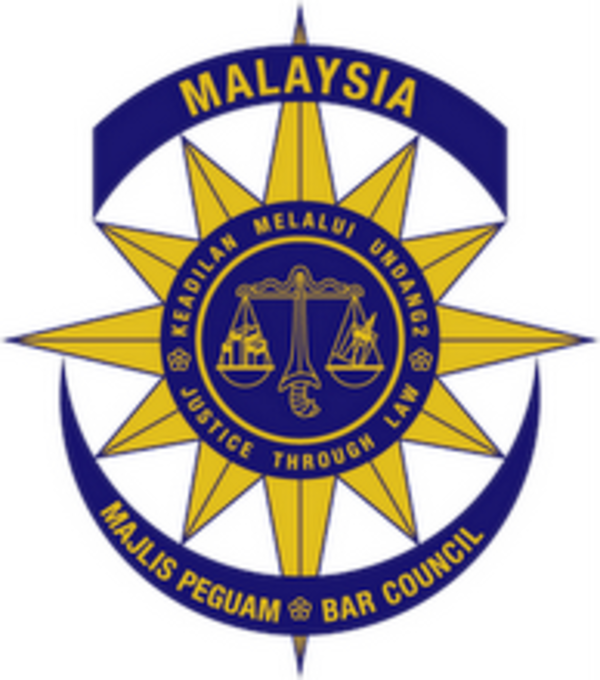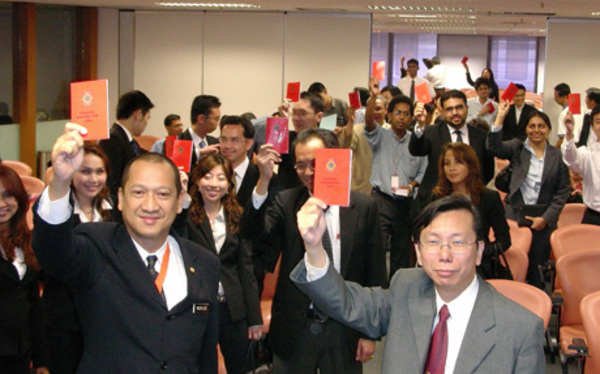1. If a plain-clothed police stops you, you may politely ask to see his Police Authority Card. A red card indicates a suspended police officer, he has no authority over you.
- If the police is not in uniform, ask for identification, say: “Please, show me your Police authority card“. Note his name and Police authority card number.
- Police authority card - Red : Suspended Police Officer. He has no authority to do anything to you. Walk away. Other colours: • Blue : Rank of Inspector and above • Yellow : Below the rank of Inspector • White : Reserve police
3. You are only obliged to provide your name, IC number and address if a policeman stops you. If he asks other questions, politely reply with "Am I under arrest?"
- You are arrested if the Police: • tell you "yes"; • do not allow you to leave/want to take you to the Police Station; or • handcuff you.
- The Police cannot arrest you just because you are a potential witness and they want to take a statement from you (Witness/112 Statement).
4. If you are NOT under arrest, you may refuse to follow the police to the police station or anywhere else
5. You have the right to a lawyer to accompany you when you are questioned by the police without arrest
- When the Police are investigating a case and think you have information / knowledge about the case, the Police may question you and take down your answers (112 Statement).
- You have the right to ask a lawyer to accompany you. This is advisable. In giving a 112 Statement, you may refuse to answer any question / remain silent if the answer is likely to expose you to a criminal offence. Before signing your Statement, read the questions and your answers written by the Police Officer carefully.
- If you refuse to cooperate, the Police may issue a formal order in writing, signed by an investigating officer (Police Officer) to ask you to cooperate. If you disobey a Police Order, you cannot be arrested. However, it is an offence and the Police may request the Magistrate to issue a warrant against you to compel you to cooperate.
6. If the police arrest you, do not resist. Ask 'Why am I under arrest' and "Which police station are you taking me to". You have the right to call a friend or a lawyer.
- Ask: "Why am I under arrest?". An arrest is unlawful if you are not informed of the reason. Do not resist an arrest The Police have the right to use reasonable force to arrest you if you resist.
- Ask: "Which Police Station are you taking me to?". The arresting Police Officer must immediately take you to the nearest Police Station and no other place.
- What to do when arrested: You have the right to telephone: 1. Your relative or friend; and 2. A lawyer. You may also call a nearby Legal Aid Centre (LAC).
- What happens after arrest: You may be detained up to 24 hours: • at the Police Station, or • in a lock-up to "assist" police investigation.
7. If you are detained, you have the right to meet and consult a lawyer. You are allowed to have a set of clothing, two baths a day, and your personal belongings must be returned to you upon release.
- Once you request for the presence of a lawyer, you have a right to consult the lawyer at the Police Station. The Police must accord you reasonable facilities and a reasonable time period for you to meet and consult the lawyer. The Police may, however, deny you this right, if the delay in questioning you may cause the occurrence of another crime or cause danger to others.
- You are allowed to take a bath two times a day. If you are sick, you have the right to receive immediate medical attention. You are to be given proper and adequate food and water during detention. The Police must record and put all your personal belongings in safe custody. Your personal belongings must be returned to you upon your release. You are allowed to have one set of clothing with you in the lock-up.
8. Police may only detain you for up to 24 hours for investigation. To extend your detention, you must be brought before a Magistrate for a remand order.
- he Police may only detain you for up to 24 hours for investigation. The duty of the Police is to complete investigations within 24 hours and to release you as soon as possible. If the Police cannot complete investigations within 24 hours, they must bring you before a Magistrate for a remand order to extend your detention beyond 24 hours (Remand Order).
9. When you are brought before a Magistrate for remand, you may ask for a shorter remand period by giving good reasons
- Ask for a shorter Remand Order from the Magistrate: Before the Magistrate makes the Remand Order, ask for a shorter period than what the Police asked. Give reasons (examples: "I will co-operate with the Police in their investigation", "I will be available and will not run away" etc).
- When you are brought before a Magistrate for remand, tell the Magistrate: • you want legal representation and you want to contact your lawyer, • if you want medical treatment because you are sick or have been beaten; • if the Police threatened or beat you during detention; • if you were denied proper and adequate food/water/clothing, access to the toilet or necessary medical attention during your detention; • whether you had been detained previously, immediately before your current detention; • whether the Police carried out any investigations during your detention.
10. Police can conduct a body search without arrest if you are found during a police raid and is believed to be hiding something like drugs
- What to do: • Do not allow the Police Officer to put his hands into your clothes or pockets. • If you are asked to take out your belongings one by one, each time, say "purse", "keys", "ID card" etc. • When your pockets/bags are empty, turn them inside out.
- If you are at a place (example: disco/karaoke/entertainment outlet) where the Police are conducting a raid to look for something there (example: drugs), the Police may detain and search you if they think you have or are hiding the thing being searched for. This may only be done in the presence of a Police Officer ranked Inspector and above.
11. A female can only be searched by a female police officer. Protest and lodge a police report if you are forced to strip naked or threatened with a strip search.
- All body searches must be carried out in a professional manner and with decency. • A female can only be body searched by a female Police Officer. • If you are forced to strip naked or threatened with a strip search: 1. Protest; 2. Remember the Police Officer's name; and 3. Lodge a police report after the incident.
12. If police conduct a body search after arresting you, it must be done in a professional manner and in private. You may request to be accompanied by your lawyer.
- All body searches must be carried out in a professional manner and with decency. The body search must be conducted in a confined place. It is your right to be bodily searched in private. It is advisable to request that you be accompanied by your lawyer for the search.
- The law allows the Police to conduct 4 types of body search:- pat down search, strip search, intimate search, and intrusive search. A female can only be body searched by a female Police Officer.
13. If you are questioned by the police during your arrest, you have the right to remain silent. Be polite when saying "I would like to exercise my right to silence".
- Identity of the Police Officer questioning you: Note the name/rank of the Police Officer questioning you.
- The Police Officer will first make friendly conversation/talk (example: ask you about your family and friends etc). You are only obliged to give your full name, age, address and occupation (Personal Particulars). Other than giving your Personal Particulars, you have the right to remain silent. Be polite. Do not be afraid to remain silent. This is your right. If you choose to remain silent, say: "I would like to exercise my right to silence".
14. Police cannot threaten or force you into making a statement. Lodge a police report if you have been threatened, beaten or forced.
- The Police Officer will ask you questions and then write down your answers. The Police cannot threaten or force you into making a Statement. If you have been threatened, beaten or forced, lodge a police report against the Police Officer at the first opportunity. This is your right.
15. Any statement you make during investigations cannot be used as evidence unless you are being charged for offences. You may use the statement to support your defence during trial.
- Generally, any Statement you make to the Police during investigations cannot be used as evidence except if you are being charged for offences under, for example, the Dangerous Drugs Act, the Kidnapping Act and the Internal Security Act. However, you may use the Statement to support your defence during your trial.
16. You are advised to call a nearby Legal Aid Centre (LAC) if you are arrested. These are their contact numbers:
- You may also call a nearby Legal Aid Centre (LAC). Inform them: • you have been arrested; • the time, place and reason of the arrest; • the Police Station you will be taken to.
- • Kuala Lumpur : 03-2691 3005 / 03-2693 2072 • Selangor : 03-5510 7007 / 03-3281 2428 • Negeri Sembilan : 06-6013 844 • Melaka : 06-2845 519 / 06-2864 514 • Johor : 07-2235 698 • Perak : 05-2550 523 • Kedah & Perlis : 04-7333 467 • Kelantan : 04-7448 660 • Pahang : 09-5159 244 / 09-2969 410 • Pulau Pinang : 04-2617 451/ 04-3108 451
- Legal Aid Centre’s objective is to enlighten the public and the impecunious in particular as to the legal aspects and to educate them about the various fundamental and legal rights and liberties that they are entitled to.
The Red Book, Created By A Group Of Lawyers Known As TANGKAP, Is A Pamphlet To Help Malaysians Know Their Basic Rights. Download The Full Pamphlet Here:
- CLICK ON LINK to download the Red Book in English or Malay.
- “The purpose of the Red Book is aimed at disseminating valuable information so that the public would know their basic rights when faced with the Police. An individual who is aware of his rights and is prepared to exert them will in all likelihood receive better treatment by a detaining authority than an individual who is ignorant and prepared to accept any form of treatment meted out,” said Nazri Aziz.
- “TANGKAP have initiated this effort of creating awareness and to provide an easy step by step guideline which would be most beneficial in ensuring that everyone has legal access and to ensure his/her rights are protected. It is not a code against the police, but more of informative codes to ensure personal freedom and dignity,” stressed Nazri.
